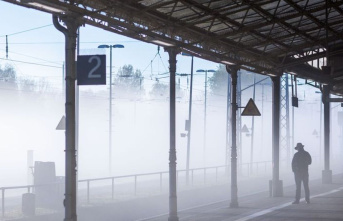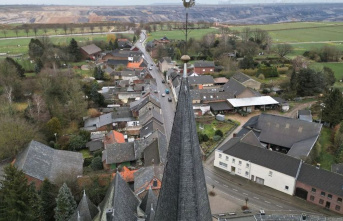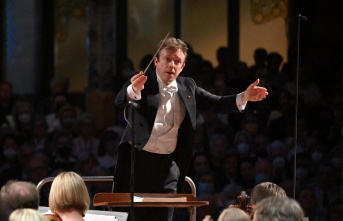If you travel on Air France, don't expect to hear his voice over the loudspeaker mid-flight saying "the captain is speaking to you." Because in the cockpit of the Airbus A320, the British Daniel Harding (Oxford, 1975) does not command as much as on the podium of the orchestras. He is a first officer, the equivalent of a concertmaster. On the other hand, the captain can be heard mentioning him along with the rest of the crew... Will the passengers know that they are in the incredible hands of the head of the Swedish Radio Symphony Orchestra?
"What difference does it make, no one is listening," answers Daniel Harding with a laugh in the only but very lively interview he gives while in Barcelona. On May 9 and 10, he conducts nothing less than the complete Brahms Symphonies at the Palau de la Música Catalana. And no, he's not on autopilot. At 46 years old and after three decades leading the best orchestras -he debuted with 16 in the Birmingham Symphony and 21 in the Berlin Philharmonic in which Claudio Abbado called him "my little prodigy"-, this star of the musical interpretation prefers to devote his energy to two completely opposite tasks.
So you get a salary from Air France even though you don't need it, is that it?
It can be seen from this perspective, yes, ha ha, I had not thought about it. But you see: there are people who take time for hobbies, others who take it to rest and then there are those of us who do other work. For me it is very healthy. I enjoy it and it suits my brain. Also, when you reach 40 it's positive to start something from scratch, especially since I've been directing wonderful orchestras for thirty years and there comes a time when you question yourself and say to yourself, "ok, I'm going to learn something new and I'm going to be constant to carry it at the highest level." It is a very healthy challenge and I think more people should do it.
People who love to fly often go to the airfield and fly a plane...
Yes, of course, but do you know what happens? I don't like to do things just a little bit.
So it is that he wants to take people, just as he directs a hundred musicians he wants to transport two hundred passengers.
Let's see, I love flying small planes, it's a lot of fun, but I wanted to transport people, yes, and also learn to be a professional. Don't do it halfway, do it properly.
But this type of aircraft goes by itself, in mid-flight the autopilot is activated... what is it doing up there?
Nooo, that's the same thing that is said about conductors. "The musicians go alone, what are you doing there", ha ha. It's a very similar job in this sense: you turn your back on the public and people think you're not doing anything. But the other day he had a friend as a passenger and he came to see us in the cabin and said "but guys, you work really hard here!" Ha ha. You are very busy there.
And does he fly transatlantic (to the despair of his agents whose calls he doesn't take)?
No, I do Europe and a bit of North Africa. I was just in Barcelona two weeks ago and a month ago.
Do you mean to say that you landed at El Prat?
Yes Yes. I go where they send me. And I've done a lot of Spain: Barcelona, Madrid, Malaga, Valencia...
And you say that Air France welcomes artists?
What happens is that they have a long tradition of saying that the corporate culture is richer for having interesting people who do different things. One of my colleagues was an astronaut, commander of an international space station; another is four-time ski champion and Olympic champion... among the 400 pilots that Air France has, there are many who are doing interesting things. Not everyone is like me, I have two lives, but they have amazing abilities. The other day I met two people from the crew who played the piano beautifully. It is a fantastic community.
And when they land, do they put on a musical soirée?
Noooo, we are very serious. But from the human point of view it is magnificent, you meet people with different perspectives. A large part of the pilot's job is to relate, that's what teamwork has to do with it. Because flying is only safe if everyone, absolutely everyone, that is, those of us in the cabin, assistants, colleagues on the radio and those in maintenance, are well connected. It is a challenge.
And don't you think that your challenge of human contact is quite covered with your role as conductor?
It is another perspective. My life as a conductor consists of making many decisions and people adapt to me. And now I have to adapt to the personality of my captain. And I have to say that I learn a lot about being a musician in the orchestra.
His double life was immediately cut short by the pandemic. Now that we are back to normal, the question is what percentage of time do you spend on each of these two jobs?
Right now I'm spending a lot of time flying, because it's something new. I'm at 50%-50%, but of course, I don't even have a day of vacation, hahaha. In the medium term I will be directing 30 or 35 programs a year, which is a lot. When I think of Claudio [Abbado] and how he told me... "you do too much, don't do so much"... I'm sure he didn't expect this to be my solution, ha ha, but the philosophy behind this phrase was that music it is something that you do committed to one hundred percent and therefore you cannot do it every day. You have to be very focused, so then you need to step back and give the music some space. He is very healthy as a musician.
Was he also such a multitasker as a child?
No, but you know that we musicians tend to spend all day with music in our heads. While we walk down the street, at dinner... we always listen to it. And it's all very well forcing yourself to focus on something else. Many musicians understand the importance of putting music aside for a while and pursuing something else intensely. This is how you clean your brain and return to pure music.
Are you saying you don't hear music in your head during flight hours?
No, and it's magnificent. It is important to disconnect. Of course your subconscious is always working on solving things, but it's good to work on something that requires enough concentration to get you away from the music.
Now he is here in Barcelona conducting the four Brahms Symphonies... Where was he three days ago?
I flew Thursday, Friday and Saturday, all national flights: Marseille, Bordeaux and Nice.
Amazing. And how has the human and musical experience with the Swedish Radio Symphony been so far? It has been 15 years since you started as a holder.
It is a magnificent orchestra, it does an incredible job, it has a beautiful sound. She is very human and humble, which is important in a musician. They give everything they have and after each concert they take their time to analyze to see what they can learn and improve. It sounds obvious, but when you're in a high-level orchestra it's easy to get used to it, and this is an orchestra that loves challenges. After 15 years together we know each other, we trust each other and there is a feeling almost like a string quartet... we work as if it were a chamber orchestra. Come on, the ideal for making music.
How comfortable is it for you to face the complete Brahms Symphonies in a two-day cycle?
Wow, it's huge. It's been years since the last time I did. It was on a tour of Japan with the Mahler Chamber Orchestra. All orchestras often play Brahms Symphonies but making them in one go is an effort. It's like reading the Iliad, it's not light at all. However, it's good to focus on a single composer, on your language, on your point of view, following the story and its development through the pieces... it's a very intense way of working. And for the public, being able to listen to them like here in Barcelona in just two days is a gift.
Has your perspective of Brahms changed over the years?
Yes, sure. Being very young I recorded the 3rd and 4th, and when I listen to them I see ideas that I like, but now they are different. And in 20 years it will be different again. This is music that is stronger than any of us, so we come in and contribute to a perspective and an understanding of those works, and each orchestra and each baton that approaches them contributes a small piece of gear.
Would you say that in the last thirty years the way of interpreting the romantic period has changed notably?
It's interesting to see the influence of the musicians who in the sixties and seventies began to play baroque music with ancient instruments, because that had a huge influence on how to interpret Mozart and then Beethoven. Later people started applying that to Brahms, Mendelssohn and Schumann, and we learned a lot from it. 20 years ago I was very fascinated by historicist interpretation, but maybe now I try to integrate all that I learned into a warmer and richer way of making music. What I always pay attention to is the fact that music needs to be played as if it were on camera and in an understandable way. Brahms writes in a constant dialogue between the instruments, and the wind parts are so interesting... we always have to look for transparency and a way of expressing ourselves that allows all that conversation to flow, so that it can be followed by people.
The second Symphony is of a tenderness that makes one think of the love he professed for Clara Schumann and could not express. Do you see it that way?
I don't know, but I do know that it's a totally different feeling than the 2nd one. It's the only one of the four that when I go on stage to play it I don't have the feeling of going to suffer, ha ha. Because the rest exhaust you physically. Instead in that you feel protected, there is a special atmosphere in it. Of course there is a lot of turbulence in the second movement, a lot of passion and setback, but there is more light than in the rest. The 4th, for example, is a terrible world. His first move is so dark and fierce...
You are dynamic on the podium. Is there any training to be in shape on the podium or is directing already the exercise itself?
A little yes, but it's curious because when we are young we all move a lot on the podium and when you get older and more disciplined not so much anymore. And then you realize that's why everyone gets fat, because they don't move enough, ha ha. Leading an extremely physical activity, and we all have to find a way to take care of ourselves. It's demanding and you use weird muscles. You have to stay flexible and aware. The truth is that none of the musical professions is particularly healthy. Playing the violin eight hours a day...it is clearly not a very natural position. But we each have to find a way.
And what does it do? Yoga?
No, I don't have that much patience. I do have a series of exercises that I like to do. And every day I give myself ten minutes to stay flexible and keep my core muscles strong. That protects you.
How do you remember the period when, being so young, you worked as an assistant to Simon Rattle or Claudio Abbado?
I would give anything to go through that period again. Between the ages of 16 and 30 I spent time with Rattle and Abbado, as well as stage directors like Peter Brook, Patrice Chéreau and Luke Bondi. He was surrounded by the most extraordinary human beings and theatrical brains. I learned a lot but I would love to have that time again being a little more mature than then. Sometimes you don't know how to get all the substance out of the inspiration around you. I was very lucky but I'm jealous of my young self. I miss those people to do opera with... Chéreau, Bondi... I have to find a new generation of stage directors with whom I can have that kind of inspiration.
That being British living in Paris has something to do with Brexit?
No, I already lived in Paris before Brexit. I'm lucky because I see my colleagues who have been stranded behind the iron curtain, ha ha. I made the decision to live in Europe a long time ago and I'm fine. I'm happy here and I can't imagine going back to the UK now. It is such an unusual decision to disconnect from the world in this way. I can't understand it. I feel sorry for them but I'm happy for myself.
4












